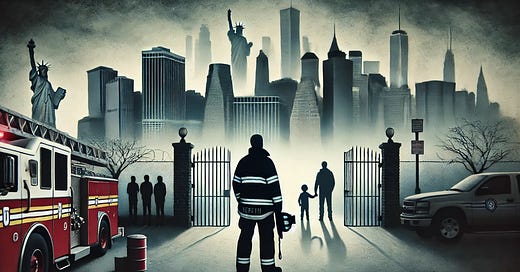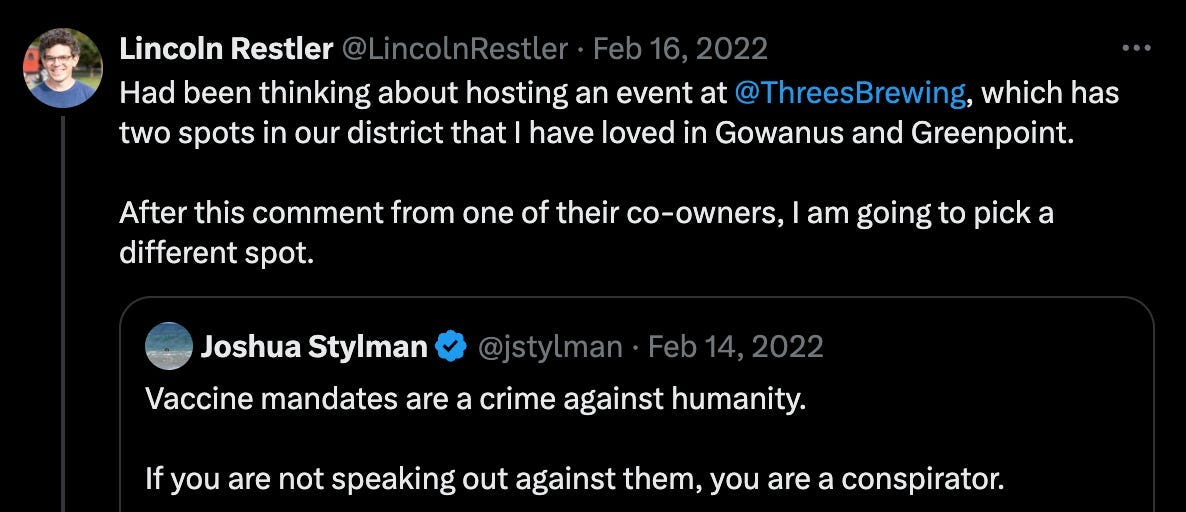Dear Councilmember Restler,
I recently received a letter from Matt Connor, Trustee of the National Coalition of Frontline Workers and a 19-year veteran of New York City fire service, regarding your opposition to reinstating public sector workers who lost their jobs due to vaccine mandates. Your office's response was telling in its brevity:
"We believe the vaccine mandate was the right decision based on the available public health information and we believe the current process for employees seeking to return to the city workforce is appropriate."
This response demands examination, not just for its stunning lack of empathy, but for what it reveals about leadership in our city. Let's be clear about what you're defending: a system that banned New Yorkers from public life based on their personal medical decisions. You, Councilman Lincoln Restler, championed policies that:
Forced dedicated public servants out of their careers
Denied children access to education and activities
Created a two-tiered society in a city that claims to value inclusion
The burden of proof for stripping someone's right to earn a living should be extraordinarily high. Yet these mandates were imposed despite manufacturers never testing for transmission prevention - a fact available in their own trial data. Today, everyone knows these shots don't prevent spread. How do you still defend a policy that was scientifically baseless from the start?
While courts increasingly affirm these mandates' fundamental injustice:
A federal jury just awarded $13 million to a wrongfully terminated IT specialist
The 8th Circuit Court revived the case of healthcare workers stripped of their careers
A NY state judge ruled the mandate unconstitutional, ordering reinstatement with back pay
Queens Supreme Court deemed the Department of Education's terminations "arbitrary and capricious"
Transit workers were awarded over $1 million each after their wrongful terminations
Yet remarkably, the Law Department proudly counts its mandate defense as an accomplishment, actively appealing cases to preserve similar powers for future emergencies. Just last week, while the 2nd Circuit Court acknowledged potential constitutional violations in religious discrimination claims, the Department persists in defending these policies. Their position was clear last Wednesday when the proposed new Corporation Counsel walked out during firefighters' testimony - a telling demonstration of how the city continues to treat these workers.
Your recent appearance at the Committee on Rules, Privileges, and Elections meeting - after being contacted by a coalition of affected workers - suggests you're well aware of these developments. As a Council Member, you have unique influence over appointments and policies that could either perpetuate these injustices or help correct them. Your colleagues look to you on these issues - will you lead them toward reconciliation or continued division?
This dismissive stance isn't new. In February 2022, when I tweeted my concerns about these mandates, your response set a pattern that continues today:
You retweeted it, adding:
I replied:
You responded:
The very next day, you told The New York Times “I'm deeply disappointed that the co-owner and managing partner would spread lies and wildly inaccurate information that undermined the health of our community.”
For a Council Member who campaigned on supporting small businesses, your choice to attack a local employer in your district - one that provided 80 jobs and contributed to the community - revealed much about your priorities.
Not only was this accusation of spreading lies demonstrably false, but your response - reducing complex human rights issues to a hollow slogan while dismissing documented injuries and lost livelihoods as 'misinformation' - showed you were more interested in political grandstanding than in serving your constituents. With your calls for boycotts and media appearances already impacting innocent employees, and my position being deliberately twisted, it was evident to me that any chance for truth-seeking or meaningful exchange became impossible. The moment was too charged, and my priority was protecting those whose livelihoods were caught in the crossfire.
What you didn't know was the weight behind those words that compelled me to speak out that morning. I had heard from a dear friend whose stepson had died months earlier, just hours after being mandated to get jabbed to keep his job at The Stephen Colbert Show. She was distraught - not just from her loss, but from the wall of silence she faced. Every media outlet had refused to hear her story. Later that same day, a teacher friend who had already lost his job due to the mandates lost his food stamps and wondered how he'd feed his daughter.
How many other families suffered similar tragedies in silence? For every story I heard - the nurse forced into bankruptcy, the policeman who lost their home - hundreds more suffered in silence. How many lives might have been saved if these stories hadn't been systematically suppressed? This wasn't just media silence - it was performative "journalism", actively suppressing information that could have helped people make informed decisions about their lives.
This wasn't an isolated case. At the time, I was working as a producer with a documentarian on 'Anecdotals', a film capturing heartbreaking stories of COVID-19 vaccine injuries that were being actively censored. Each suppressed story left others vulnerable, unaware of risks that might have changed their decisions.
While I had the good fortune to be able to leave the brewery I co-founded rather than compromise my principles, most New Yorkers faced an impossible choice: violate their conscience and take an unprecedented medical intervention with unknown long-term effects and inadequate safety data, or lose their livelihood.
These are the same essential workers our city celebrated every night, banging pots and pans from our windows in gratitude. In a matter of months, these heroes became outcasts - stripped of their livelihoods and dignity for making personal medical choices. Then we cast them aside like they were disposable, and now won't even let them return to serve their communities. This didn't just destroy careers - it tore families apart. Grandparents separated from grandchildren, brothers and sisters banned from seeing nephews and nieces. The human cost rippled through our entire community.
Fear may have driven initial decisions, but everyone now knows these policies caused profound harm. You positioned yourself as a progressive champion while supporting perhaps the most regressive labor policy in NYC history. It's one thing to be catastrophically wrong when fear clouds judgment. It's another to double down years after the evidence has become undeniable.
So now, in November 2024, I'm accepting your offer of conversation. Let's have it publicly and transparently. These aren't abstract discussions - they're about real New Yorkers whose lives were upended by these policies. They're about families who lost homes, careers, and pensions. They're about the vaccine-injured who were ignored, and the workers who watched their decades of service erased overnight. These are the conversations our city needs to heal.
If you still stand behind these policies, I welcome the opportunity to engage in meaningful, public dialogue about their impact. This could be a chance for both sides to be heard with the respect and attention they deserve. Your willingness to participate would demonstrate real confidence in your position.
New York should lead the way in reconciliation. Together, we could create a model for how cities heal from even their deepest divisions. By engaging in honest discussion, we can forge a path forward that honors both the gravity of these decisions and our shared commitment to justice.
This isn't just about policy - it's about our humanity. Every day these workers remain excluded is another day we betray not just them, but the very values of inclusion and justice you claim to champion. You have an opportunity here to demonstrate real leadership - not by defending past mistakes, but by helping to right these wrongs. Such dialogue could set a precedent for how our city addresses difficult truths and works toward healing.
Many of those whose lives were upended by these policies are willing to forgive - they understand the fear that drove these decisions. But no one should forget. Forgetting would give license for such violations of human rights to happen again, and that can never be allowed. Real healing requires both acknowledgment of past wrongs and safeguards against their repetition.
Which kind of leader will you be - one who perpetuates harm to avoid admitting error, or one who helps heal our city? History awaits your answer.
I await your response.
Joshua Stylman









Josh, This is a really strong piece. Any chance you can get it picked up in the Post or some other paper of record? Too good to lose and is too likely to be underexposed.
This horrifying Lincoln Restler is a blatant fully owned and operated puppet of his globalist technocrat parasite masters same as numerous 'PUBLIC SERPENTS' infesting by design from above, the bureaucratic apparatus.
Humanity everywhere is being assaulted by THE TECHNOCRATIC OMNIWAR! RESIST! DO NOT CONSENT TO ALL THINGS DIGITAL, 'SMART', AI, 5G, NO CASH - ALL OF IT! dhughes.substack.com Technocrat ruling class psychos get a sadistic thrill from their powers over life and death and hurting all who stand in their way and they need the resources worldwide to build their digital total slavery control grids (herd survivors into 15 minute city digital prisons)!